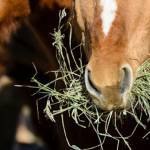Fecal Microbiota Transfer Beneficial for Horses

Horses rely on the fragile microbial ecosystem of their hindgut for optimal well-being. If that ecosystem is thrown into turmoil, through die-off of beneficial microbes or proliferation of noxious ones, gastrointestinal health can deteriorate. When microbial upset occurs, it’s important to right the situation as quickly as possible. One little-known method of repopulating the hindgut with beneficial bacteria is fecal microbiota transfer (FMT).
“Fecal microbial transplant, or fecal transfaunation, involves taking feces from a healthy patient and placing it in the gastrointestinal tract of a patient with a digestive disorder, thereby introducing robust, beneficial bacteria that, in turn, may colonize and rebalance the microbiome,” said Kathleen Crandell, Ph.D., a nutritionist with Kentucky Equine Research. This procedure has been performed in humans as well as horses.
“In humans, the feces is placed directly into the large intestine through the rectum, but that is very difficult to do in horses due to the length of the rectum and dorsal colon. In horses, the feces is placed directly into the stomach through nasogastric tube,” Crandell explained further. “The process is straightforward. Fecal balls from a healthy horse are thoroughly mixed with water, and the mixture is then strained. The liquid fraction is tubed into the stomach of the sick horse with the assumption that some of the bacteria will make it all the way to the hindgut intact.”
How does this differ from coprophagy, or manure-eating, in horses, especially foals, observed the world over? It’s not different, according to Crandell, proving that ingestion of feces is a natural way to populate the gastrointestinal tract with helpful microbes.
Fecal microbiota transfer is especially useful for horses with bacterial diarrhea, like salmonellosis, that is not squelched by traditional veterinary remedies.
“Although I had seen an older veterinarian use FMT on a neighbor’s horse many, many years ago and have occasionally seen it performed since, the real value of the procedure didn’t hit me until I began learning more about the human microbiome through some continuing education opportunities,” said Crandell. “In one course, the instructors explained that the most unresponsive intestinal bacterial infection, caused by Clostridium difficile, was being treated with fecal transplants quite successfully. Then, shortly thereafter, when at a conference in Mexico City, I met a researcher who spoke about probiotics and mentioned FMT as the only truly effective probiotic found so far in horses.”
This researcher, according to Crandell, treated many horses through FMT and was convinced that it was the best method for rectifying an intestinal imbalance.
In her experience with FMT, Crandell has seen no adverse effects from the treatment. “To put it simply, it either helps the horse or it doesn’t. In most instances, it helps, and I’ve never seen a horse become sicker from FMT.” One caveat: the feces donor must be a truly healthy horse, said Crandell, as there is the potential for disease transmission if the donor is unhealthy.
As veterinary science becomes more and more advanced, some might find FMT too old-fashioned to be used regularly. “Developing a process that is more sophisticated could increase the appeal of the procedure and benefit some desperate horses. In addition to horses, I think FMT could be a huge boon for certain production animals, like sheep and hogs,” said Laura Petroski-Rose, B.V.M.S., a veterinarian with Kentucky Equine Research.
“Prevention, though, is always preferable to treatment,” advised Petroski-Rose, “so it would be best to address gastrointestinal problems, like hindgut acidosis, as soon as they become apparent.” A drop in pH, known as acidosis, can completely reconfigure the microbial population of the hindgut to the horse’s detriment, causing a loss of appetite with concurrent weight loss, loose manure, mild and recurrent colic, and even unexplained behavioral issues.
To counteract hindgut acidosis, choose EquiShure, a time-released hindgut buffer developed by Kentucky Equine Research. EquiShure delivers a buffering agent to the hindgut through a targeted delivery system and stabilizes hindgut acidity.
Does your horse have gastrointestinal issues? Are you concerned that you might not be feeding for optimal digestive health? Contact a Kentucky Equine Research nutrition advisor for a custom consultation.








